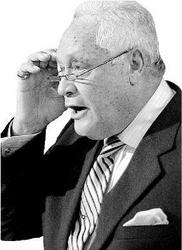
Henry ... placed reparation issues on front burner in 2007.
The controversial debate about reparations for Jamaican descendants of slaves is set to be rekindled with the establishment of a national commission to examine the issue.
The Cabinet has approved the commission, to be chaired by university professor Dr Barry Chevannes and which should include leading members of the local educational and cultural community.
In announcing the establishment of the commission Wednesday, Information and Culture Minister Olivia 'Babsy' Grange did not provide details of the financing, but Gleaner sources said it would cost the country millions.
"It cost $20 million for the Ganja Commission and this will follow a similar pattern, so expect that with inflation it will cost the government much more," a government source told The Gleaner.
The Reparations Commission is to begin work as soon as the members are confirmed and will be given 18 months to present its recommendations to Grange.
"Reparation, as we know, has been the subject of discussion in Jamaica and the Caribbean for many years and it has long been a part of the post-slavery dialogue in response to the challenges faced by particular groups in the society," Grange told journalists at the weekly post-Cabinet media briefing.
She noted that the 2001 World Conference Against Racism declared slavery a crime against humanity and accepted that many persons believe the descendants of slave masters should compensate the descendants of those who were enslaved.
The issue of reparations for people of African ancestry was placed on the front burner in 2007 by then Opposition Member of Parliament Mike Henry, whose private members motion sparked a lively debate in the House of Representatives.
Minister upbeat
The matter was placed before a Parliamentary Committee but seemed to have died after the Jamaica Labour Party's victory in the 2007 general elections and the committee was not reconstituted.
Yesterday, Henry, who is now the minister of transport and works, was obviously upbeat as he praised his Cabinet colleagues for the decision to establish the commission.
"My position is that the United Kingdom Government paid the slave owners and they have not yet paid the slaves and therefore my position is the same amount you paid the slave owners you must now pay the slaves, compounded over the period of time," Henry said.
But Grange was clear that the Chevannes-led commission was not mandated to look for methods of compensation only.
"If you look at the issue of reparations, Minister Henry says it is about getting the money; there are other groups who say it is about getting some apology, while there are others who believe reparation can come in many forms, debt forgiveness, and all these views are being sought and then we will arrive at a consensus," Grange told journalists.
Terms of reference for Reparations Commission
Receive submissions, hear testimony, evaluate research and study, and engage in dialogue with relevant interest groups, legal and academic experts. Undertake public consultation as necessary with the aim of guiding a national approach to reparations.
Recommend the diplomatic initiatives, the security considerations, education and public information required.
Recommend the form or forms that such reparations may take.